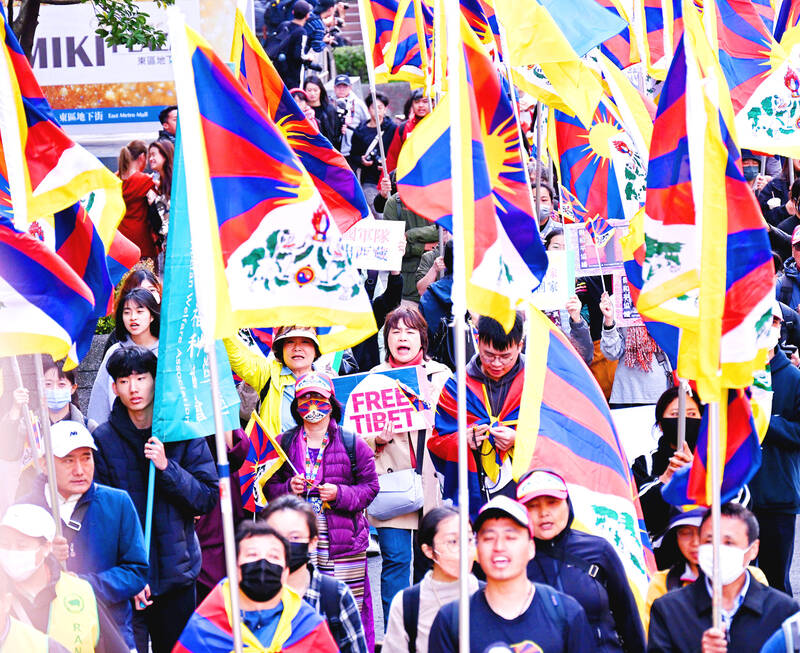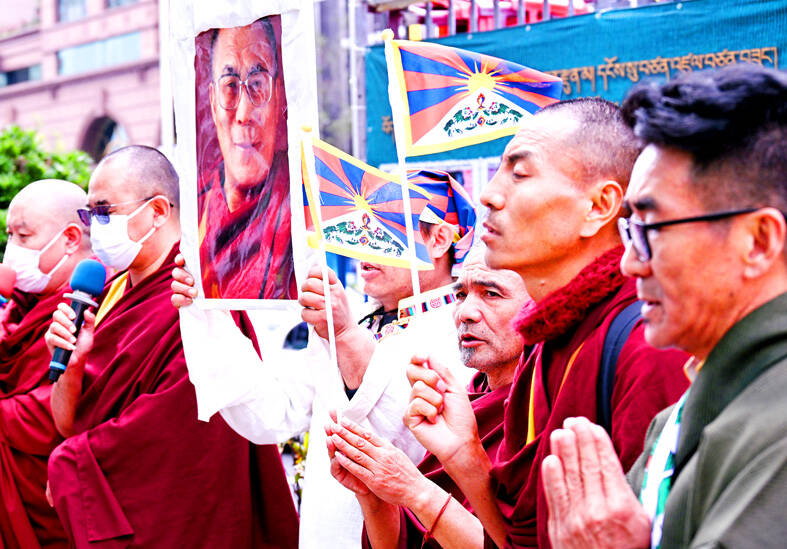Hundreds of people yesterday marched in Taipei to commemorate the 66th anniversary of the Tibetan uprising, protesting the Chinese Communist Party’s (CCP) cultural and ethnic genocide in Tibet.
When the protesters arrived at Sun Yat-sen Memorial Hall, they held a ritual to commemorate people killed in the uprising. At the Taipei branch of Bank of China in Xinyi District (信義), they demonstrated against the disappearance of the Panchen Lama and the destruction of Tibetan Buddhist culture.
Kelsang Gyaltsen Bawa, representative to Taiwan of the Tibetan government-in-exile, said the theme of this year’s march was “Tibet has never been part of China.”

Photo: Fang Pin-chao, Taipei Times
Tibetan Uprising Day on March 10 honors those who participated in the Tibetan uprising against CCP rule 66 years ago, while calling for freedom and human rights in Tibet, he said.
In 1951, the CCP used force to compel Tibet to sign the Seventeen-Point Agreement, or the “Agreement on Measures for the Peaceful Liberation of Tibet,” but then occupied Tibet, resulting in the deaths of more than 1.2 million Tibetans, he said.
China’s repressions in Tibet continues, with at least 157 Tibetans self-immolating in protest, he added.

Photo: Fang Pin-chao, Taipei Times
Kelsang Gyaltsen Bawa said the so-called “peace agreement” was malicious, and in the year it was signed, Chinese troops occupied Tibet, tearing up the agreement that promised Tibetans the right to self-government.
On March 10, 1959, the CCP ordered the suppression of a protest against China in Lhasa, which led to the Dalai Lama and many other Tibetans fleeing to India, he said, adding that Beijing continues to carry out cultural, religious and ethnic genocide in Tibet.
The UN last year reported on China’s long-term human rights abuses in Tibet, as well as its threats against Tibetans living abroad, Kelsang Gyaltsen Bawa said.
He said he was hopeful the march would make more Taiwanese aware of the situation in Tibet.
The march was not just to commemorate the uprising, but to express the hope that Tibetans would one day be able to return to their homeland, he said, adding that the Dalai Lama is to turn 90 this year.
Human Rights Network for Tibet and Taiwan secretary-general Tashi Tsering said the CCP has intensified the oppression of Tibetans since Chinese President Xi Jinping (習近平) took office, while also cracking down on democracy movements in Hong Kong and constantly threatening Taiwan.
Tibetans hope the Chinese military would leave Tibet, he said.
“Tibet belongs to the Tibetans, just as Taiwan belongs to Taiwanese,” he added.
National Human Rights Commission Vice Chairwoman Wang Yu-ling (王幼玲) and Control Yuan members Kao Yung-cheng (高涌誠), Yeh Ta-hua (葉大華) and Chi Hui-jung (紀惠容) also attended the march, the first time that the commission has participated in the annual event.
Wang said the issues in Tibet are human rights matters, as the CCP invaded and occupied Tibet under the pretense of a peace agreement, and it is continuing to destroy Tibetan culture and religion.
“Human rights have no borders, as it is a universal value, and today’s Tibet could be the future of Taiwan,” she said, adding that the commission is honored to stand beside friends who care and support Tibetans, hoping the issues in Tibet can be understood by more people.

People can preregister to receive their NT$10,000 (US$325) cash distributed from the central government on Nov. 5 after President William Lai (賴清德) yesterday signed the Special Budget for Strengthening Economic, Social and National Security Resilience, the Executive Yuan told a news conference last night. The special budget, passed by the Legislative Yuan on Friday last week with a cash handout budget of NT$236 billion, was officially submitted to the Executive Yuan and the Presidential Office yesterday afternoon. People can register through the official Web site at https://10000.gov.tw to have the funds deposited into their bank accounts, withdraw the funds at automated teller

PEACE AND STABILITY: Maintaining the cross-strait ‘status quo’ has long been the government’s position, the Ministry of Foreign Affairs said Taiwan is committed to maintaining the cross-strait “status quo” and seeks no escalation of tensions, the Ministry of Foreign Affairs (MOFA) said yesterday, rebutting a Time magazine opinion piece that described President William Lai (賴清德) as a “reckless leader.” The article, titled “The US Must Beware of Taiwan’s Reckless Leader,” was written by Lyle Goldstein, director of the Asia Program at the Washington-based Defense Priorities think tank. Goldstein wrote that Taiwan is “the world’s most dangerous flashpoint” amid ongoing conflicts in the Middle East and Russia’s invasion of Ukraine. He said that the situation in the Taiwan Strait has become less stable

FRESH LOOK: A committee would gather expert and public input on the themes and visual motifs that would appear on the notes, the central bank governor said The central bank has launched a comprehensive redesign of New Taiwan dollar banknotes to enhance anti-counterfeiting measures, improve accessibility and align the bills with global sustainability standards, Governor Yang Chin-long (楊金龍) told a meeting of the legislature’s Finance Committee yesterday. The overhaul would affect all five denominations — NT$100, NT$200, NT$500, NT$1,000 and NT$2,000 notes — but not coins, Yang said. It would be the first major update to the banknotes in 24 years, as the current series, introduced in 2001, has remained in circulation amid rapid advances in printing technology and security standards. “Updating the notes is essential to safeguard the integrity

REASSURANCE: The US said Taiwan’s interests would not be harmed during the talk and that it remains steadfast in its support for the nation, the foreign minister said US President Donald Trump on Friday said he would bring up Taiwan with Chinese President Xi Jinping (習近平) during a meeting on the sidelines of the APEC Summit in South Korea this week. “I will be talking about Taiwan [with Xi],” Trump told reporters before he departed for his trip to Asia, adding that he had “a lot of respect for Taiwan.” “We have a lot to talk about with President Xi, and he has a lot to talk about with us. I think we’ll have a good meeting,” Trump said. Taiwan has long been a contentious issue between the US and China.